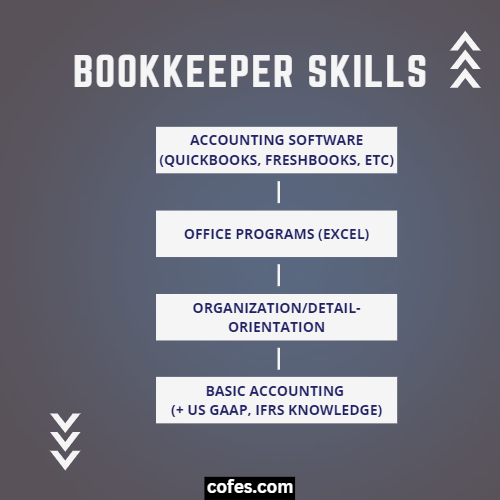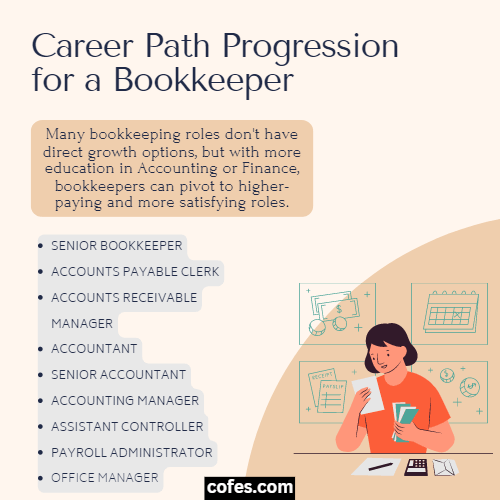You may be working towards becoming an accountant, switching careers, or you may be a current bookkeeper looking for more information on your field and how to progress.
Whatever your needs are, the resources below will assist you in learning what’s required to succeed as a bookkeeper, how much you can expect to earn, and how to progress through your career path in this field.
Bookkeeper Information Table
| Official Job Title | Bookkeeper |
| Average Salary | $42,598 / year |
| Stress Level | High |
| Work / Life Balance | Average |
| Job Satisfaction | Very Low |
| Career Advancement | Below Average |
Bookkeeper Job Description
What Is a Bookkeeper?
A bookkeeper is somebody responsible for recording the financial transactions of a company.
They must keep financial statements updated and ensure accuracy at all times.
A bookkeeper will reconcile what the company is expecting with what is happening in bank statements to ensure there is nothing unexpected happening.
Generally, you will provide this information to managers or company owners to make decisions on the business.
What Does A Bookkeeper Do On A Daily Basis?
- Accept and record all incoming payments, such as electronic credits, cash, cheques, and vouchers.
- Produce reports on all incoming and outgoing payments for the business.
- Verify that expected debits and credits match between company reports and bank statements.
- Meet with management or owners to review financial statements, including any variances between reports and bank statements.
- Meet with department heads or office managers to discuss budgets.
- Disperse petty cash as needed and record it.
- Process receipts from employees and accept them if appropriate and within budget.

Responsibilities, Duties & Roles Of A Bookkeeper
The general responsibilities and duties of a bookkeeper are:
- Record all financial transactions of a company, incoming and outgoing payments.
- Process outgoing payments.
- Perform any banking duties/requirements for the company.
- Produce financial reports for managers or owners.
- Reconcile financial reports with bank statements.
- Work with a tax preparer and ensure compliance.
- Process receipts or vouchers for employees
- Invoice clients and accept payments
Bookkeeper Salary
Average Salary
The average salary for a bookkeeper in the US is between $38,100 and $47,287 per year.
You should expect to see at least cost of living increases in a yearly review of your salary.
So, the longer you are with a company, the higher your pay may become.
Starting Salary
The starting salary for a bookkeeper can vary, but this is between $34,000 – $40,000 per year.
If you are offered a bookkeeper position below this range, you should review the other factors, such as your location and average salaries.
Senior Salary
A senior bookkeeper makes, on average, around $51,555 per year.
However, the longer you are with a company, you may find your salary reaches a ceiling and can’t increase.
At this point, you would need to decide if you’re happy with the pay and position or if you want to find a larger company to work for and handle more responsibilities for a higher income.
How to Become a Bookkeeper
The Entry Level: Certification, Training & Degree
Because you are dealing with a company’s money which is a critical component of any business, most companies will require you to have an associate’s or bachelor’s degree.
It would be better if it were in a financial or business field of study.
You can also take specific courses in bookkeeping to prove you have the skills required.
Other Skill Sets, Requirements & Qualifications
While not required, you can become a Certified Public Bookkeeper, enhancing your options when applying for positions.
How Long Does It Take To Become A Bookkeeper?
If you have an associate’s degree or bachelor’s degree, you can start applying now.
You could even work as an intern and be trained on the job, which could take six months.
If not, or you’re looking for some specific bookkeeper training, those courses are often self-paced, so it would take as long as you need to complete the course.
Is It Hard To Become A Bookkeeper?
If you are proficient with computers and spreadsheets, have good math skills, and are very detail-orientated, it’s not hard to become a bookkeeper.
Your options will improve if you have a degree, experience in a related field, or have taken courses for bookkeeping.
If you are starting, you will likely need to work with smaller companies and gain experience before opportunities open up and you can earn more money.
Bookkeeper Career Paths
The Bookkeeper Roadmap
Your career as a bookkeeper may stay just that.
You can continue to work as a bookkeeper and potentially change companies to earn more money, or you may be happy in one position.
The next step may be to become a bookkeeper supervisor.
With experience and becoming a certified public bookkeeper, you may open up opportunities to work as a bookkeeper supervisor and take on a more managerial role within a larger organization.
From there, you could continue your education, which may be what you’re already doing.
After continuing your education, you could become an accountant or certified public accountant, which has greater opportunities and a much higher pay scale.
Projections For Growth In Bookkeeper Jobs
Bookkeeping job growth is expected to decline over the next ten years.
This decline may be due to automating a lot of the tasks bookkeepers do, outsourcing to bookkeeping companies, and even SAAS companies providing services to perform the actions of a bookkeeper.

In Summary: Is Bookkeeper A Good Career?
When you look at the overall satisfaction of bookkeepers, their career growth, and the pay, it may not be a great career choice if you hope to progress further and into new opportunities.
To move up from bookkeeping, you would likely require an accounting degree or to move to an unrelated field.
Your other option would be to start your own business and provide bookkeeping to multiple clients, improving pay but increasing responsibilities.
Bookkeeper Working Conditions
Can A Bookkeeper Work Remotely From Home?
There is no technical reason a bookkeeper can’t work remotely.
You are dealing with reports, spreadsheets, and banking which is all possible online.
In addition, you do not physically need to meet with anyone unless you are handling petty cash or performing duties not generally done by a bookkeeper.
How Many Hours Does An Bookkeeper Work?
A bookkeeper would typically work a Monday – Friday, 9 am – 5 pm schedule.
There’s typically no overtime required or weekend work.
Can A Bookkeeper Work Part-Time?
A bookkeeper could work part-time, especially for smaller companies where fewer transactions are being performed.
It may also depend on your speed when working.
If you can perform all actions for the day or week in a short timeframe, then there would be no specific reason you need to work full-time.
What Are The Average Vacation Days Of A Bookkeeper?
As a bookkeeper, your average vacation days would be the standard for your company, about ten days a year in the US, with statutory holidays added on top.
Alternative Careers & Similar Jobs to a Bookkeeper
- Office Manager
- Medical Office Administrator
- Accounting Manager
- Finance Manager
- Administrative Manager
- Office Clerk
- Administrative Assistant
- Auditor
- Accounting Director
- Cost Estimator
- Budget Analyst
- Payroll Clerk
- Financial Analyst
Bookkeeper Resume Tips
- Include any bookkeeper-specific software you have experience with, including things like QuickBooks, FreshBooks, and even Office programs like Excel.
- Include any soft skills critical to being a good bookkeeper, such as being detail orientated and organized.
- If your degree isn’t in a financial or business area, include any information on your math or business skills taken as part of the degree.
- Outline any previous experience with reporting, financial responsibilities, and others listed in the job description.
Bookkeeper Interview Questions
Q1: What bookkeeping software do you have experience with?
Why it works: If an applicant already knows the software used in a company, they can hit the ground running.
No previous experience with the software would mean additional training is required, which may not be optimal for your needs.
Q2: Are you familiar with the legal requirements in our location (city, state, federal)?
Why it works: Depending on where the applicant has previously worked, the legal requirements may differ, or the applicant may not know the specific legal requirements, which could be a red flag for an employer.
Q3: What sort of reports have you previously created?
Why it works: If an applicant has previous experience with the type of reports they need to create, this would keep training to a minimum and gauge the understanding of your requirements from the bookkeeper.
Jobs Related to Bookkeepers
- Accountants
- Tax preparers
- Payroll and timekeeping clerks
- Bank clerks
For HR Managers: Tips for Hiring a Bookkeeper
Key Characteristics To Look For In A Bookkeeper
- Excellent Communication
- A bookkeeper must communicate effectively with department heads, managers, and owners. Failure to communicate could cause significant problems when dealing with a company’s finances.
- Experience in a Similar Industry
- A bookkeeper with experience in the same sector will mean they can pick up trends, understand common issues, and know when something doesn’t look right.
- Software Skills
- A bookkeeper with experience in the same software you use will make training and the ability to get them up to speed quickly. If you need to train a bookkeeper, it could take up to six months.
Minimum Level Of Education & Experience
Bookkeepers are entrusted with company finances and ensuring accounting records are accurate.
So, at a minimum, bookkeepers should have an associate’s or bachelor’s degree in a financial or business field.
The more experience the applicant has, the better.
However, that depends on company requirements and the complexity of your finances.
